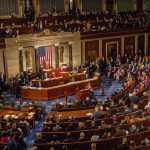United States President Donald Trump has threatened to place a 35 percent tariff on goods coming from Canada starting August 1. The warning was made in a letter shared on his social media platform, Truth Social.
This comes as both countries are in the middle of final talks to reach a new trade and security deal by their agreed deadline of July 21. Trump said the new tariffs will be separate from existing charges on steel, aluminium, cars, and other goods.
He claimed the move is needed because of what he described as Canada’s failure to stop the flow of fentanyl into the US, the country’s trade deficit with the US, and its restrictions on American dairy products.
“If Canada works with me to stop the flow of fentanyl, we will, perhaps, consider an adjustment to this letter,” Trump wrote. “These Tariffs may be modified, upward or downward, depending on our relationship.”
Canadian Prime Minister Mark Carney responded by saying his government would keep defending its people and industries. In a post on X, he added that Canada has taken steps to stop the smuggling of fentanyl and was working with the US to protect both countries.
He also reminded that the actual amount of fentanyl coming from Canada into the US is very small. Data from US Customs shows that only 0.2 percent of fentanyl seizures at the border are linked to Canada. Most of it is intercepted at the border with Mexico.
Earlier this year, Canada increased funding for border checks and appointed a top officer, referred to as a fentanyl czar, to deal with the crisis after repeated pressure from Trump.
At the recent G7 Summit in June, both Trump and Carney said they were committed to reaching a new trade deal within 30 days. That deadline now hangs in the balance.
Trump also warned that Canada should not retaliate with its own tariffs, or the US could raise its levies even higher.
In the past, Canada has answered US tariff threats with counter-measures of its own. It also removed a tax on major American tech companies in June after Trump called it an attack and said it would hurt trade talks. Carney later explained that removing the tax was part of a larger trade discussion with the US.











